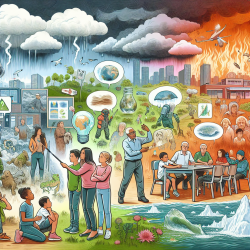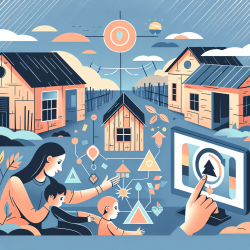Understanding Climate Change Through the Eyes of Youth: A Call to Action for Practitioners
As speech-language pathologists, our mission is to empower children to express themselves and navigate the complexities of their world. A recent study titled "Climate awareness, anxiety, and actions among youth: a qualitative study in a middle-income country" offers valuable insights into how young people in Brazil perceive and react to climate change. This research highlights the importance of understanding the emotional and cognitive dimensions of climate change, especially in low- and middle-income countries (LMICs).
The Study: A Snapshot
The study conducted focus groups with 50 children and adolescents aged 5 to 18 years in Brazil. It identified three distinct profiles of involvement with climate change: unaware, disengaged, and engaged. These profiles were influenced by socioeconomic contexts and were analyzed across dimensions of space, time, emotions, and actions. This nuanced understanding of how youth perceive climate change can guide practitioners in tailoring their approaches to foster effective communication and engagement.
Key Findings and Implications for Practitioners
- Spatial and Temporal Perceptions: Children’s understanding of climate change is influenced by their immediate environment and perceived proximity of climate impacts. Practitioners should consider these spatial and temporal perceptions when designing interventions.
- Emotional Responses: Feelings of anxiety, anger, and despair were prevalent among engaged youth, while disengaged youth exhibited indifference. Practitioners can help children articulate these emotions and develop coping strategies.
- Socioeconomic Influences: Socioeconomic status played a significant role in awareness and engagement levels. Understanding these influences can help practitioners address barriers to information access and action.
Actionable Steps for Practitioners
Practitioners can leverage these findings to enhance their practice and support children in becoming proactive global citizens. Here are some strategies:
- Integrate Climate Education: Incorporate discussions about climate change into therapy sessions, using age-appropriate language and materials.
- Foster Emotional Expression: Create safe spaces for children to express their feelings about climate change and develop resilience.
- Promote Collective Action: Encourage group activities that emphasize teamwork and collective responsibility for environmental stewardship.
Encouraging Further Research
This study underscores the need for further research into the psychological impacts of climate change on youth, particularly in LMICs. Practitioners are encouraged to contribute to this growing field by conducting studies or collaborating with researchers to explore innovative interventions.
To read the original research paper, please follow this link: Climate awareness, anxiety, and actions among youth: a qualitative study in a middle-income country.










